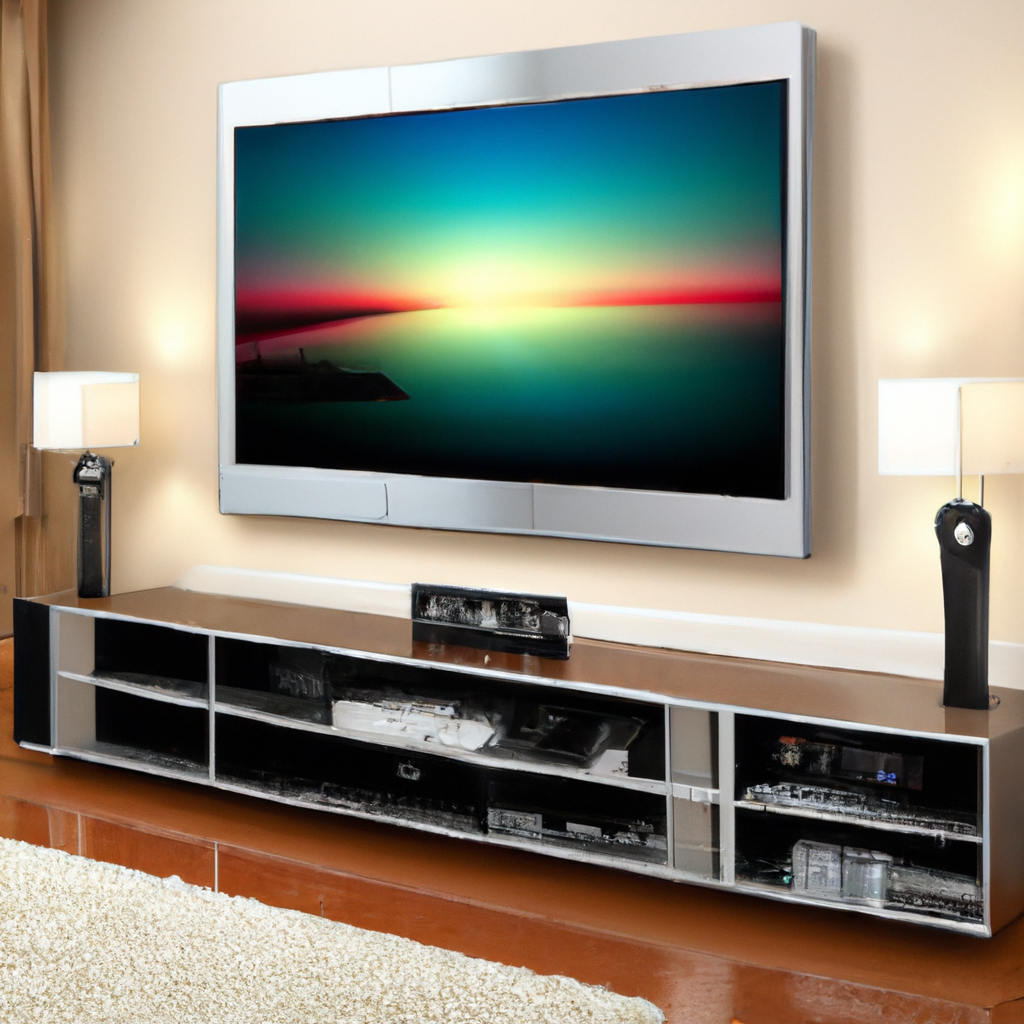Imagine being able to control your entire home entertainment system with just a touch of a button or a simple voice command. Smart home entertainment is the future of transforming your living space into a tech-savvy haven. From streaming your favorite movies and shows seamlessly to creating immersive sound experiences, this article will explore the fascinating world of smart home entertainment and uncover the innovative ways it works to enhance your viewing pleasure. Get ready to revolutionize your home entertainment setup as we guide you through the exciting features and functionalities of these cutting-edge technologies.
What Is Smart Home Entertainment?
Definition of Smart Home Entertainment
Smart home entertainment refers to the integration of advanced technology and automation in your home to enhance your entertainment experience. It involves the use of smart devices and systems that can be controlled and monitored remotely, allowing you to enjoy a wide range of audio and visual content from the comfort of your own home.
Components of Smart Home Entertainment
Smart home entertainment comprises various components that work together to create a seamless and immersive entertainment experience. These components include smart speakers and voice assistants, smart TVs and streaming devices, gaming consoles and virtual reality systems, and home theater systems. Each component plays a crucial role in delivering high-quality audio and visual content.
Smart Home Entertainment Systems
Smart Speakers and Voice Assistants
Smart speakers, such as Amazon Echo and Google Home, are integral to a smart home entertainment system. These devices are equipped with voice assistants, like Alexa and Google Assistant, that allow you to control your entertainment devices through voice commands. With smart speakers, you can play music, control your TV, and manage other smart devices in your home, all with simple voice commands.
Smart TVs and Streaming Devices
Smart TVs and streaming devices, such as Roku and Apple TV, bring a world of streaming content right to your fingertips. These devices connect to the internet and give you access to popular streaming services like Netflix, Hulu, and Amazon Prime Video. Smart TVs also provide features like screen mirroring, allowing you to display content from your smartphone or tablet directly on the TV screen.
Gaming Consoles and Virtual Reality
For gamers, smart home entertainment includes gaming consoles like Xbox and PlayStation. These consoles not only provide access to a vast library of games but also offer streaming services and multimedia capabilities. Additionally, virtual reality (VR) systems, such as Oculus Rift and HTC Vive, allow you to immerse yourself in virtual worlds and enhance your gaming experience.
Home Theater Systems
Home theater systems are an essential part of smart home entertainment setups. They consist of high-quality speakers, amplifiers, and receivers that deliver immersive surround sound. With a home theater system, you can recreate the cinematic experience in your own living room. Some systems also include projectors and screens to create a full-fledged home theater.

Smart Home Entertainment Features
Voice Control and Automation
One of the key features of smart home entertainment is voice control and automation. With the integration of smart speakers and voice assistants, you can control your entertainment devices using simple voice commands. From adjusting the volume to changing channels or even searching for specific movies or songs, voice control adds convenience and ease to your entertainment experience.
Streaming Services and Content Options
Smart home entertainment systems provide access to a wide range of streaming services and content options. Whether it’s movies, TV shows, music, or podcasts, you can easily stream your favorite content directly to your smart devices. Popular streaming services like Netflix, Spotify, and YouTube are readily available, offering an extensive library of entertainment options at your fingertips.
Multi-Room Audio and Video Distribution
With smart home entertainment, you can extend your audio and video distribution to multiple rooms in your house. By integrating your smart devices and speakers, you can play synchronized music or video throughout your home. This allows you to create a seamless entertainment experience no matter where you are in your house.
Customizable Lighting and Ambiance
Smart home entertainment also allows you to customize your lighting and ambiance to suit your mood. By integrating smart lighting systems like Phillips Hue, you can create lighting scenes that align with the content you’re enjoying. For example, you can dim the lights and set a warm color tone when watching a movie for a more immersive experience.
How Does Smart Home Entertainment Work?
Connectivity and Networking
Smart home entertainment relies on robust connectivity and networking to function effectively. Your smart devices need to be connected to a reliable internet connection to access streaming services and online content. Additionally, they need to be connected to each other for seamless control and automation. This is typically achieved through Wi-Fi or wired connections.
Integration with Other Smart Devices
Smart home entertainment systems can be integrated with other smart devices in your home. This integration allows you to control and monitor all your smart devices from a central hub or through voice commands. For example, you can use your voice assistant to not only control your entertainment devices but also adjust the temperature, lock the doors, or even start your robotic vacuum cleaner.
Control and Automation Platforms
To manage and control your smart home entertainment system, you need a control and automation platform. This platform acts as a central hub that allows you to control your devices, set up automation routines, and monitor their status. Examples of popular control platforms include Amazon Alexa, Google Home, and Apple HomeKit. These platforms enable you to manage your devices through smartphone apps or voice commands.

Benefits of Smart Home Entertainment
Convenience and Accessibility
One of the major benefits of smart home entertainment is the convenience and accessibility it offers. With voice control and automation, you can easily navigate through your entertainment options without the need for remotes or manual inputs. Moreover, the ability to access a wide range of content from streaming services ensures that you never run out of entertainment options, all at the touch of a button or a voice command.
Enhanced Audio and Visual Experience
Smart home entertainment systems provide enhanced audio and visual experiences compared to traditional setups. With high-quality speakers, surround sound systems, and advanced video capabilities, you can immerse yourself in movies, music, and games like never before. The integration of customizable lighting and ambiance further enhances the overall experience, creating a truly immersive entertainment environment.
Energy Efficiency and Cost Savings
Smart home entertainment systems also offer energy efficiency and cost savings. Many devices are designed to consume less power when not in use or when in standby mode. Additionally, features like intelligent power management and energy monitoring help you optimize energy usage and reduce your electricity bills. Moreover, by eliminating the need for multiple devices and cables, smart home entertainment setups contribute to a clutter-free and organized living space.
Considerations for Setting Up Smart Home Entertainment
Compatibility and Integration
When setting up a smart home entertainment system, compatibility and integration are crucial factors to consider. Ensure that all your devices and components are compatible with each other and can be seamlessly integrated into your chosen control platform. This will ensure that you have a smooth and cohesive entertainment experience without any compatibility issues or limitations.
Internet Bandwidth and Speed
Since smart home entertainment relies heavily on internet connectivity, it is essential to have a reliable and high-speed internet connection. Streaming content, downloading updates, and controlling your devices all require a stable internet connection with sufficient bandwidth. Make sure you have a reliable internet service provider and consider upgrading your internet plan if needed.
Security and Privacy Concerns
With the increased connectivity and integration of smart devices, security and privacy concerns become important considerations. Ensure that your smart home entertainment system has robust security measures in place to protect your data and devices from unauthorized access. It is advisable to use strong passwords, enable two-factor authentication, and regularly update your device firmware and software to mitigate any potential security risks.

Popular Smart Home Entertainment Brands
Amazon
Amazon is a leading player in the smart home entertainment market with its range of Echo smart speakers and Alexa voice assistant. The Echo devices offer seamless integration with various entertainment platforms and services, while Alexa provides intuitive voice control capabilities.
Google offers a comprehensive smart home entertainment ecosystem with its Google Home speakers and Google Assistant. The Google Home devices can control a wide range of entertainment devices and services, providing a user-friendly entertainment experience.
Apple
Apple’s HomePod and Apple TV devices are part of its smart home entertainment lineup. The HomePod combines high-quality audio with Siri voice control, while Apple TV allows access to a vast library of streaming content and immersive gaming experiences.
Sonos
Sonos specializes in multi-room audio systems and offers a range of speakers that can be seamlessly integrated into a smart home entertainment setup. With Sonos, you can enjoy synchronized music throughout your home, controlled through a dedicated app or voice assistants.
Samsung
Samsung’s smart home entertainment offerings include smart TVs, soundbars, and home theater systems. These devices provide high-quality audio and visual experiences, with features like screen mirroring and integration with popular streaming services.
Future Trends in Smart Home Entertainment
Artificial Intelligence and Machine Learning
Artificial intelligence (AI) and machine learning (ML) are expected to play a significant role in the future of smart home entertainment. These technologies will enable devices to learn user preferences, personalize content suggestions, and automate various tasks, further enhancing the overall entertainment experience.
Augmented Reality and Mixed Reality
With the advancement of augmented reality (AR) and mixed reality (MR), the future of smart home entertainment will likely involve immersive experiences beyond traditional audio and visual content. AR and MR technologies will enable users to interact with virtual objects and environments, blurring the line between physical and digital entertainment.
Interactive and Immersive Experiences
The future of smart home entertainment will focus on delivering more interactive and immersive experiences. From interactive storytelling to virtual theme park experiences, advancements in technology will enable users to engage with entertainment in new and exciting ways, creating unforgettable experiences within the comfort of their own homes.

Challenges and Limitations of Smart Home Entertainment
Cost and Affordability
One of the main challenges of smart home entertainment is the initial cost and affordability of setting up a comprehensive system. Smart devices can be expensive, especially if you opt for high-end components. Additionally, ongoing costs such as internet subscriptions and streaming service subscriptions can also add up. However, as technology advances, costs are expected to decrease, making smart home entertainment more accessible to a wider audience.
Technological Complexity
Another challenge is the technological complexity of setting up and managing a smart home entertainment system. Integrating and configuring multiple devices and platforms can be daunting for some users, requiring technical knowledge and troubleshooting skills. However, user-friendly interfaces and improved integration capabilities aim to simplify the setup and management process, making it more user-friendly over time.
Privacy and Data Security
As with any connected technology, privacy and data security are valid concerns in the realm of smart home entertainment. With devices constantly collecting data for personalization and automation purposes, there is a potential risk of data breaches and unauthorized access. It is important to choose reputable brands, regularly update firmware and software, and enable security features to mitigate these risks and protect your privacy.
Conclusion
Smart home entertainment has revolutionized the way we enjoy audio and visual content within our homes. From voice-controlled speakers to streaming devices and home theater systems, smart home entertainment offers convenience, accessibility, and an immersive experience like never before. As technology continues to advance, the future of smart home entertainment holds promising trends such as AI, AR, and interactive experiences. While challenges such as cost and complexity exist, the benefits and possibilities of smart home entertainment make it an exciting and worthwhile investment for any entertainment enthusiast.











